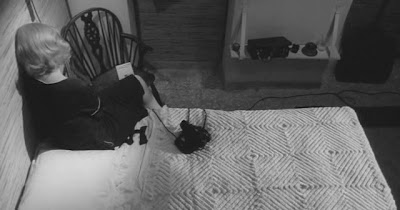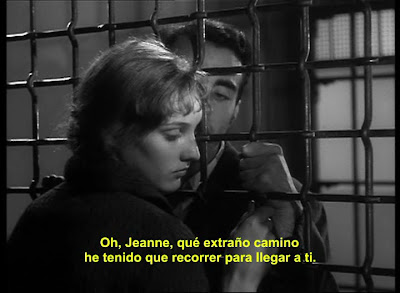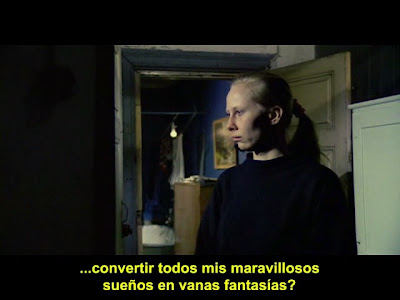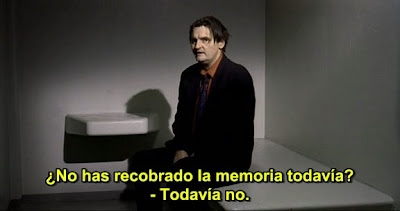(4/4)
Excerpt from article entitled "Shadows (also) in Paradise," published in its extended version, in Shangri-la. Drifts and fiction apart . No. 10. 2009.
Shadows (also) in paradise IV

"You can think quickly on the day it happened. Or the friends who passed and were lost forever, but it's no escape: the silence is there. Even the worst suffering, that of lost friendship is only escape. Well if at first the silence seems to wait for an answer, how we burn to be called to account ", you soon discover that nothing required of you, maybe just your silence. [...] So soft is for human beings finally show his unworthiness and be forgiven on the grounds that it is a human being humiliated by birth. Until he discovers that he does not even want his unworthiness. He is the silence. "
Silence. Clarice Lispector
And the most visible traces of the universe Kaurismäki? The influences on this film and therefore in their style, they are different, some recognized by it (Buñuel, Becker, Bresson and Ozu) and evident for a few flights a movie buff (Bresson, Fassbinder, Ozu and Jarmusch). Also curious that the director mentioned the beginning of Godard, he quickly explains that he no longer cares the least widely held view in many directors. However, returning to the tracks, the first one reveals more obvious is the American independent director Jim Jarmusch and, above all, his second film Stranger Than Paradise (1984), title, and also even. The film, made by 67 planes rigid sequences, is a bold proposal on monitoring aesthetic characters marked by a vacuum and that, as Kaurismäki found his main solace in music. Kati Outinen seeing inevitable bear the radio, while playing Tease Me Baby by John Lee Hooker, Eszter Balint think not also carrying his radio while listening I put a spell on you Screamin Jay Hawkins , a friendly voice and torn. Jarmusch, like Kaurismäki, injected into a vein of music, including musicians like John Lurie and Tom Waits and placed stories in cities like Memphis. Both Kati Outinen Eszter Balint as two characters aimlessly guided by two bluesman who put lyrics to his feelings. The association between the two filmmakers was sealed in Jarmusch's cameo in Lenigrand Cowboys Go America, a parody of Finnish director.

However, the most vital link in the characters lies in the feeling of escape of the suspect bathed change of scenery (New York, Cleveland and Florida) do not commute in essence things, a pessimistic paths fly over the two proposals. In fact, when Kati Outinen talks about the experience of his aunt in Florida make it in that sense, and perhaps because the end does not try to change the destination of the flight, as Tallinn and Florida have the same value for it. The characters of E xtraño in paradise not show interests and needs, are forgetful that high expectations do not arise. They are simply filmed watching from inside, like Kaurismäki, and unwilling to explain, or narrative, or thinking about entertaining the viewer. Jarmusch recorded downtime and we see the characters walk, watch television, read the newspaper, sleeping, as we see Matti Pellonpää fried with a fried egg. The feeling between the protagonists of the film Jarmusch, remote and frigid, no leak to the outside and come on, but dormant, more glaring in Kaurismäki. We in a world scale ghostly gray, empty streets and ragged interior, not far the Kaurismäki Finland. Characters ultimately exiled in their own universe, with the only consolation of a flight that does not console, but also shortens the life and enhances the anxiety of an impossible dream become nightmarish hallucination.

Another movie that comes to me is Katzelmacher (1969) by Fassbinder, and not by the subject, the cold, boring and monotonous life of a group of young people living in a suburb of Munich with altered arrival of a Greek immigrant, but rather by sober technique, its styling, as well as the background of love as an instrument of domination commercial. Love as synonymous with dependence, shield against loneliness and helplessness, rather than love as synonymous with selfless and mature union, purely altruistic. This vision of love as a tool of domination burst more precisely interested in The fittest , where exploitation of feeling is absolute. Love Is Colder Than Death (1969) is the explicit title of one of the first German film director. Also, unlike later works where the emotions of the characters in Fassbinder hatched without measure, in this film there is some contention couple Kaurismäki's characters. Aesthetically inaction abounds through static shots and repetitive, with only a few tracking shots and a total absence of effects. Silences abound, but also the total absence of music unlike Kaurismäki. The dialogues are sometimes abrupt and disorderly, the highest point of the iceberg hidden under the surface. Debugging (Fassbinder was a man of the theater) as well, as in Kaurismaki, ends up falling into the extreme stylization of its forms. On the other hand, predestination and fatalism, of coarse dummies to the sound of experience given, is evident in the dialogues of Fassbinder through a glimmer of faith, artificial, and charged, which makes self-righteous characters in the future. Towards the end of the film, one of the protagonists, Hans Hirschmüller, speaks to leave the army because "it is better to plan things work and then not come to anything or change anything" or when Hanna Schygulla, the muse of director speaks of traveling to Greece in a dialogue that may well sign Kaurismäki.
actually it, as Kati Outinen and Matti Pellonpää, sensed that is no different. However, as stated in the appointment of Yaak Karsunke the beginning of the film: "It is better to err further perpetuates the old ... into oblivion."

Another reference work (for service) is Michelangelo Antonioni and his trilogy of solitary confinement, composed Adventure (1960), Night (1961) and The Eclipse (1962) but could also include The Red Desert (1965). Italian director, through his minimalist style and refined, portraying the loneliness and isolation, but in a different social stratum: the bourgeois. In a very superficial analysis, because the will is referential, Antonioni with his silence showed the impossibility of a satisfactory relationship between the characters, besides being in itself a dramatic element and the axis of the confusion of his characters, similar to the use Kaurismäki makes, which also uses the empty sound, like spaces and the most basic actions for designing emotionally to his characters, but without the pomp of Antonioni and elegance in the film. Now both classic and detonate the story the viewer's expectations for the silent character description. When Matti Pellonpää psychiatric visits where his sister entered, she says, "I've been so alone." But then the view is blurred and does not seem very concerned with the visit of his brother, so this asks, "Want to go back inside?". She replies with a laconic "Yes." A scene of a startling lack of communication where everything is told in three lines of dialogue and a couple of looks.

Perhaps minimalist Kaurismaki film, aimed at minimizing perceptible elements, without action, without characters, is mostly associated with a marked director for his asceticism as Robert Bresson, but Kaurismäki is oblivious to everything spiritualism. A cinema known for its cleansing and austere, sober, without great fanfare and a little sour. Read some quotes from his notes on the cinematographer found interesting associations that could well define Kaurismäki thinking, and thus applied to Shadows in Paradise. Stances many disjointed and stressing in this analysis.

Robert Bresson, admired by Kaurismäki, is declared a formalist and says that a movie is above all a style. And if anything is evident in the progression of Kaurismäki is a style, incorruptible, and the will to possess. "I have a certain style. No matter how bad it is, but a style, either way, "he confessed in an interview Kaurismäki. It echoes any moviegoer over specific plots and characters, since the most visible in Kaurismäki's his style, telling staff that way, both as regards the form and content. Kaurismäki seems convinced that no argument or dialogue will take you as far as the radicalization of his style. Bresson said: "The theme of the film is just a pretext. How much more than the content, which captures and elevates the viewer. " That is one of the First impressions after seeing, for the first time Shadows in Paradise, and especially The girl in the match factory. not attract as much attention explains what ultimately tried by some frames everywhere, but the way used to explain these stories, showing the surface of things, trivial aspects, usually purified in understanding cinema as spectacle , and the removal of high points, but let's not forget to hit the viewer from underground. Both are revealed in this sense Jansenists, applying a cold and rigid style, but steady heartbeat. Both
also feel antipathy by the arguments and entanglements. Bresson claims: "In my films, and increasingly, I try to suppress what people call the argument. The argument is a trick of novelists. " In S ombras in paradise, give arguments against the actions, if not only spark a glimpse of the will of the protagonists, with no clear objective or declared by them. The background always says more, that latent. Moreover, his conception of the word in the film is also a friend: "The word is not there rather than to go even deeper into things. In sum, the ideas would need to enroll in the film with images and sounds sisters equivalent, the word comes only at the last moment, as a relief, "says Bresson, although the use of the word in Bresson has more sense and is of greater wealth than Kaurismäki. However, the voiceover the protagonist, Martin LaSalle, in some fragments of Pickpocket is inconceivable in Kaurismäki, where there is only one point of view, the narrator's character, or reflective or memory. Still, both seem to agree that the public is more apt to feel rather than understand, however the break is much more radical in Kaurismaki, which are found mostly in solitary confinement or communication sickly sips.

can be said to try, rather than express reality in a realistic way, "to communicate true feelings." And Shadows in Paradise, with an overly pathological and hurtful, somewhat obscure, stirs emotions more real than those that can be drawn from a proposal streamlined and shining, especially those related to the hardness and futility of existence. Both believe in the image and not settle for a sanitized contemplation. Instead, seek the true expressive playing through the interaction of multiple images, their times, and not simply through speeches or gestures of the actor, for Bresson "photographed theater" by bringing back the feelings and less obvious forms and subterfuge, away from the stereotyped formulas. Images often insignificant, but which ceases once juxtaposed and breathe in the course of the film, and the reality that lies between frames captured.

further doubt where Kaurismäki Bresson and is in the use of music. "Bringing a silence. Silence is a hundred times more dramatic music, "says Bresson, he shoots his films fragments of sounds and silences. And missing doubt that distance, he adds: "No musical accompaniment, supportive and reinforcing. Absolutely nothing about music. " Unless, of course, the music performed by visible objects, the diegetic which was introduced in their latest films.
is also significant purge any hint of drama in both actoriles evocations, especially in Kaurismäki, much more content and without bias paroxysmal. All remaining consciously and with the iron clean waiver to give the characters of psychological attributes very pronounced, for "why people behave as they do is, ultimately incomprehensible. "

However, the most vital link in the characters lies in the feeling of escape of the suspect bathed change of scenery (New York, Cleveland and Florida) do not commute in essence things, a pessimistic paths fly over the two proposals. In fact, when Kati Outinen talks about the experience of his aunt in Florida make it in that sense, and perhaps because the end does not try to change the destination of the flight, as Tallinn and Florida have the same value for it. The characters of E xtraño in paradise not show interests and needs, are forgetful that high expectations do not arise. They are simply filmed watching from inside, like Kaurismäki, and unwilling to explain, or narrative, or thinking about entertaining the viewer. Jarmusch recorded downtime and we see the characters walk, watch television, read the newspaper, sleeping, as we see Matti Pellonpää fried with a fried egg. The feeling between the protagonists of the film Jarmusch, remote and frigid, no leak to the outside and come on, but dormant, more glaring in Kaurismäki. We in a world scale ghostly gray, empty streets and ragged interior, not far the Kaurismäki Finland. Characters ultimately exiled in their own universe, with the only consolation of a flight that does not console, but also shortens the life and enhances the anxiety of an impossible dream become nightmarish hallucination.

Another movie that comes to me is Katzelmacher (1969) by Fassbinder, and not by the subject, the cold, boring and monotonous life of a group of young people living in a suburb of Munich with altered arrival of a Greek immigrant, but rather by sober technique, its styling, as well as the background of love as an instrument of domination commercial. Love as synonymous with dependence, shield against loneliness and helplessness, rather than love as synonymous with selfless and mature union, purely altruistic. This vision of love as a tool of domination burst more precisely interested in The fittest , where exploitation of feeling is absolute. Love Is Colder Than Death (1969) is the explicit title of one of the first German film director. Also, unlike later works where the emotions of the characters in Fassbinder hatched without measure, in this film there is some contention couple Kaurismäki's characters. Aesthetically inaction abounds through static shots and repetitive, with only a few tracking shots and a total absence of effects. Silences abound, but also the total absence of music unlike Kaurismäki. The dialogues are sometimes abrupt and disorderly, the highest point of the iceberg hidden under the surface. Debugging (Fassbinder was a man of the theater) as well, as in Kaurismaki, ends up falling into the extreme stylization of its forms. On the other hand, predestination and fatalism, of coarse dummies to the sound of experience given, is evident in the dialogues of Fassbinder through a glimmer of faith, artificial, and charged, which makes self-righteous characters in the future. Towards the end of the film, one of the protagonists, Hans Hirschmüller, speaks to leave the army because "it is better to plan things work and then not come to anything or change anything" or when Hanna Schygulla, the muse of director speaks of traveling to Greece in a dialogue that may well sign Kaurismäki.
01:24:44,726 -> 01:24:52,123
"I will take to Greece this summer.
- And his wife?
"That does not matter. In Greece everything is different.
actually it, as Kati Outinen and Matti Pellonpää, sensed that is no different. However, as stated in the appointment of Yaak Karsunke the beginning of the film: "It is better to err further perpetuates the old ... into oblivion."

Another reference work (for service) is Michelangelo Antonioni and his trilogy of solitary confinement, composed Adventure (1960), Night (1961) and The Eclipse (1962) but could also include The Red Desert (1965). Italian director, through his minimalist style and refined, portraying the loneliness and isolation, but in a different social stratum: the bourgeois. In a very superficial analysis, because the will is referential, Antonioni with his silence showed the impossibility of a satisfactory relationship between the characters, besides being in itself a dramatic element and the axis of the confusion of his characters, similar to the use Kaurismäki makes, which also uses the empty sound, like spaces and the most basic actions for designing emotionally to his characters, but without the pomp of Antonioni and elegance in the film. Now both classic and detonate the story the viewer's expectations for the silent character description. When Matti Pellonpää psychiatric visits where his sister entered, she says, "I've been so alone." But then the view is blurred and does not seem very concerned with the visit of his brother, so this asks, "Want to go back inside?". She replies with a laconic "Yes." A scene of a startling lack of communication where everything is told in three lines of dialogue and a couple of looks.

Perhaps minimalist Kaurismaki film, aimed at minimizing perceptible elements, without action, without characters, is mostly associated with a marked director for his asceticism as Robert Bresson, but Kaurismäki is oblivious to everything spiritualism. A cinema known for its cleansing and austere, sober, without great fanfare and a little sour. Read some quotes from his notes on the cinematographer found interesting associations that could well define Kaurismäki thinking, and thus applied to Shadows in Paradise. Stances many disjointed and stressing in this analysis.

Robert Bresson, admired by Kaurismäki, is declared a formalist and says that a movie is above all a style. And if anything is evident in the progression of Kaurismäki is a style, incorruptible, and the will to possess. "I have a certain style. No matter how bad it is, but a style, either way, "he confessed in an interview Kaurismäki. It echoes any moviegoer over specific plots and characters, since the most visible in Kaurismäki's his style, telling staff that way, both as regards the form and content. Kaurismäki seems convinced that no argument or dialogue will take you as far as the radicalization of his style. Bresson said: "The theme of the film is just a pretext. How much more than the content, which captures and elevates the viewer. " That is one of the First impressions after seeing, for the first time Shadows in Paradise, and especially The girl in the match factory. not attract as much attention explains what ultimately tried by some frames everywhere, but the way used to explain these stories, showing the surface of things, trivial aspects, usually purified in understanding cinema as spectacle , and the removal of high points, but let's not forget to hit the viewer from underground. Both are revealed in this sense Jansenists, applying a cold and rigid style, but steady heartbeat. Both
also feel antipathy by the arguments and entanglements. Bresson claims: "In my films, and increasingly, I try to suppress what people call the argument. The argument is a trick of novelists. " In S ombras in paradise, give arguments against the actions, if not only spark a glimpse of the will of the protagonists, with no clear objective or declared by them. The background always says more, that latent. Moreover, his conception of the word in the film is also a friend: "The word is not there rather than to go even deeper into things. In sum, the ideas would need to enroll in the film with images and sounds sisters equivalent, the word comes only at the last moment, as a relief, "says Bresson, although the use of the word in Bresson has more sense and is of greater wealth than Kaurismäki. However, the voiceover the protagonist, Martin LaSalle, in some fragments of Pickpocket is inconceivable in Kaurismäki, where there is only one point of view, the narrator's character, or reflective or memory. Still, both seem to agree that the public is more apt to feel rather than understand, however the break is much more radical in Kaurismaki, which are found mostly in solitary confinement or communication sickly sips.

can be said to try, rather than express reality in a realistic way, "to communicate true feelings." And Shadows in Paradise, with an overly pathological and hurtful, somewhat obscure, stirs emotions more real than those that can be drawn from a proposal streamlined and shining, especially those related to the hardness and futility of existence. Both believe in the image and not settle for a sanitized contemplation. Instead, seek the true expressive playing through the interaction of multiple images, their times, and not simply through speeches or gestures of the actor, for Bresson "photographed theater" by bringing back the feelings and less obvious forms and subterfuge, away from the stereotyped formulas. Images often insignificant, but which ceases once juxtaposed and breathe in the course of the film, and the reality that lies between frames captured.

further doubt where Kaurismäki Bresson and is in the use of music. "Bringing a silence. Silence is a hundred times more dramatic music, "says Bresson, he shoots his films fragments of sounds and silences. And missing doubt that distance, he adds: "No musical accompaniment, supportive and reinforcing. Absolutely nothing about music. " Unless, of course, the music performed by visible objects, the diegetic which was introduced in their latest films.
is also significant purge any hint of drama in both actoriles evocations, especially in Kaurismäki, much more content and without bias paroxysmal. All remaining consciously and with the iron clean waiver to give the characters of psychological attributes very pronounced, for "why people behave as they do is, ultimately incomprehensible. "
00:19:58,800 -> 00:20:16,315
- Hey!
- Yes?
- Wait!
- I do not think that works.
- What?
- Nothing.
Shadows in Paradise








